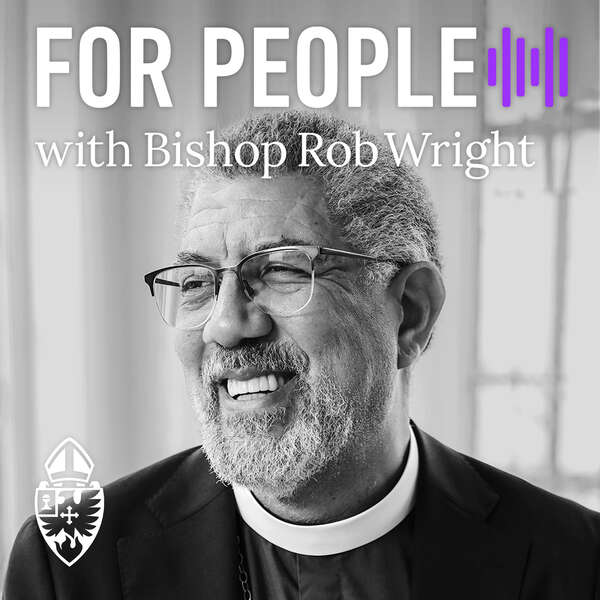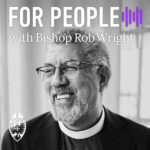Summer Shorts #5
Easton: This is For People with Bishop Rob Wright.
Melissa: Welcome to For People with Bishop Rob Wright. I’m Melissa Rau and this is Summer Shorts. This summer, we’ve asked our listeners to share questions they have for Bishop. Today marks the final question of our five-part summer series.
Bishop, I happen to know you love good questions. And he might even value a good question over a good answer. One of my favorite things is getting to ask you questions that you get excited about answering. So, here’s my question from you direct from Southwest Florida.
What questions Bishop do you wrestle with? Do you have any juicy, existential questions you actively ponder?
Rob: Wow, that’s great. You know, well, first of all, I think I want to say that I have, you know, I’ve had a life altering sort of event. You know, when I really started realizing that it’s really about better questions than just the answers, a lot of us were sort of raised up and climbed ladders in terms of our careers, etc., on being able to sort of answer questions rapidly. And that’s a good thing. We were those kids in school, we had our hand up, oh, oh, oh, call on me. We were those kids. I was that kid.
And then, you know, you sort of go through a phase of life where that really rewards you, you know. You know, achievement, accomplishment, position, etc. And then you get to a place in life where it’s really about the questions, right? If we look at Jesus, Jesus actually was a really good question maker. Because questions are always, you know, an invitation to deep, deep reflection and partnership, right?
So, questions, just trying to make better questions is what I spent a lot of time thinking about, and asking myself about, you know. How to make better questions that have an unlocking effect? And unlocking effect, you know, out of some of the patterns and ruts that we find ourselves in with God, with the church, with one another. So, I don’t have a lot of answers there. But I am working on, you know, the questions. I always say that, you know, when I did this study and this work, Jesus is actually not the answer as the billboards, you know, and the bumper sticker say, actually, Jesus is the question. And our life gets to be the answer. Our life gets to be the response.
But more specifically, I think, one of the questions I think about a lot is, so what is the future of this thing we call church, right? What is its future? If you look around, what we call mainstream denominations, mainstream sort of Protestant denominations, are all in some version of pretty good decline. And it looks like what we’ve had over the last 50 or more years is really a generational and even a cultural expression of what church is. The music, the way we organize ourselves, etc. And younger people, it seems, don’t want that by and large. They want something else. I’m encouraged because they’re still asking questions about what is a good life? What is forgiveness? What does generosity mean? How do we make things better? How do I love and care for neighbor? They’re still asking about those questions. But in terms of the church being that place where they go and seek those answers, and they go and seek fellowship around that, that has changed pretty significantly.
So, this Episcopal church that I love, you know, I think about her, a lot. And I think about, I think we get a lot of things right. But I think that we’re really in a challenge season right now. And I think we need to learn how to adapt. And we won’t know how to adapt until we sort of develop the capacity to run some experiments. And to try to figure out, you know, what does God need from us in this season right now? Some people have hunkered down and they’re just sort of hoping to, sort of metaphorically, kick the can down the road. And say, well, as long as I’m buried from the Episcopal Church, the way it used to be, then I’m happy. And that’s a bit of a selfish perspective, I must say.
And so, I think a lot about what are the experiments we need to run? Who are the people we need to invite into leadership, lay and ordained? Who can help us to move forward? And then, there’s the old question, right? So, what is absolutely precious stuff that we must conserve? And what is expendable? What can we lay down on the journey forward?
And so, these are not questions that show up in a sermon all the time. But these are nevertheless questions because I do believe that we are the stewards of Jesus’s work in the Earth. And I want to be a good steward. I know a lot of people want to be good stewards. Be good stewards of Jesus and his teachings and his example. And I want to figure out how to do that without constraining it to the way my preference is, my small preference is to the exclusion of other people.
We have a big God and a big savior. And we want to have a big church that is radically open to all kinds of people. And that is secure enough in its offering that it can be adaptive.
Melissa: When you talk about adaptive, you’re talking about our younger generations, and you know, relevancy and all that stuff. And I can’t help but wonder if that’s maybe the reason why they’re kind of, I don’t want to say repulsed. But maybe they have the bullshit sniffer. And they know that our definitive answers are not resonating with them. And so, how do we adapt in a way that makes room for not knowing and allows other generations to help shape our questions? Therefore, our answers? I don’t know. I don’t know that’s a question. But I feel like you’ve got some incredible wonderings. And I don’t know if you have any last ideas about why you think it’s important to maintain curiosity and wonder over definitive belief and answers?
Rob: Well, because God is on the move. I mean, you know, we’ve got to stop. You know, we’ve got to free Jesus, you know, as Diane Butler Bass was talking to us about some months ago. We’ve got to free Jesus. We’ve got to free him from the prison of our minds and the prison of our own hearts. Jesus is big. And Jesus is on the move. And the point of Jesus being resurrected was that he could not be contained by the grade, right?
And so, you and I sometimes are, you know, people, sometimes try to put Jesus in their own personal, you know, custom crafted tombs, right? So, that he doesn’t get out and ask us to risk things or cause us, you know, consternation.
I think that’s what young people see sometimes when they see us older folks, is they see people who are sort of, you know, defanged Jesus. And they know that that’s not the genuine article, right? Even if they don’t articulate it, they know that there’s a gap between, what we say and how we live. And so, I think that the church being the church, and increasing its appetite for experimentation, and learning, and risk taking, I think is exactly what young people are looking for in us. And until they see that in us, they are going to go somewhere else.
Melissa: Well, Bishop, I always enjoy wondering with you. And I’m grateful for your wisdom that you share with us. And we’re also grateful for you listeners for tuning in to Summer Shorts and For People.
You can follow us on Instagram and Facebook at Bishop Rob Wright. Please subscribe, leave a review, and we’ll be back with you next week.



